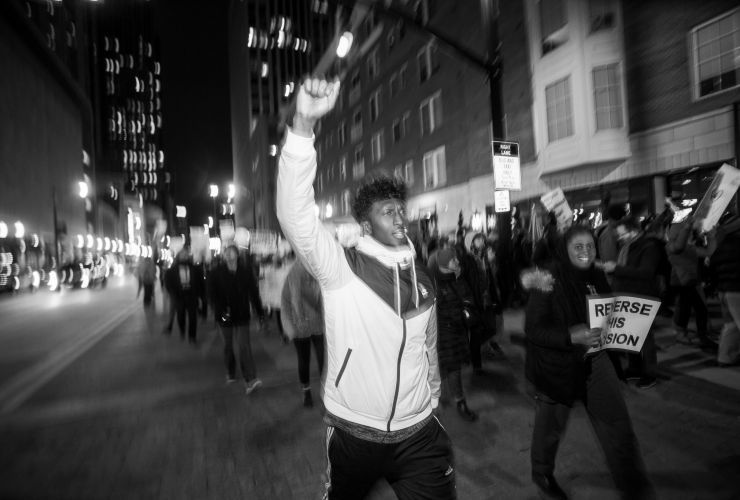
One year ago, in the aftermath of the election of Donald Trump to president of the United States, historian Robin D. G. Kelley wrote in the Boston Review that “the outcome should not have surprised us.” He was referring to the idea that Trump was not an electoral anomaly but rather the culmination of right-wing and racist tendencies that had been gathering in the US (and world) political system for many years. Now Kelley revisits those words he wrote, asking if the fears and predictions he expressed at the time have been borne out. After one year of Trump, he argues that “now more than ever we have to do much more than fight back, we have to fight for the world that could liberate and sustain us all when Trump is gone.” Here’s a longer snippet from the piece:
We worried about the “normalization” of the Trump regime, perhaps to our detriment. These people are not seeking normalization. Like fascists everywhere, they thrive on the abnormal, on the chaotic, on the symbolic. Violence continues to bubble up from below, in the marches and terrorist attacks by white supremacists and the so-called alt-right, in mass shootings, and in the random attacks that the administration is quick to prosecute within its xenophobic war on terror.
But there is hope, and I don’t mean impeachment or a Democratic sweep of the House and Senate in the midterm elections. I argued a year ago that we need a transformative, multiracial movement committed to “dismantling the oppressive regimes of racism, heteropatriarchy, empire, and class exploitation that is at the root of inequality, precarity, materialism, and violence in many forms.” Such movements are emerging now, and they are coming from the South. One source is the far South, which is to say Puerto Rico. The combination of Puerto Rico’s debt crisis, the neoliberal stripping of assets, resources, and democracy, and the devastation of hurricanes Irma and Maria, has turned the island into a global site of resistance. Even before hurricane season, Puerto Ricans had taken to the streets to protest austerity measures, unemployment, school closures, rising debt, and the environmental catastrophe caused by the island’s only coal-fire power plant in the town of Peñuelas. The slow and inadequate response on the part of the Federal Emergency Management Association (FEMA) and the federal government generally has only fanned the flames of opposition, as corporate interests look at the collapse of the power grid as an “opportunity” to privatize PREPA (Puerto Rico Electric and Power Authority), the largest public utility company in the United States. Students and trade unions, groups like Citizen Front for Auditing the Debt on the island, and Defend Puerto Rico, Diaspora en Resistencia, and Call to Action on Puerto Rico in the diaspora are just a few of the movements resisting neoliberal and neocolonial rule.
Image via the Boston Review.